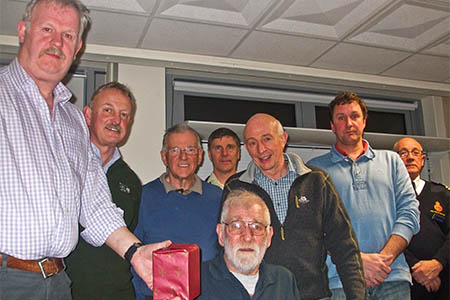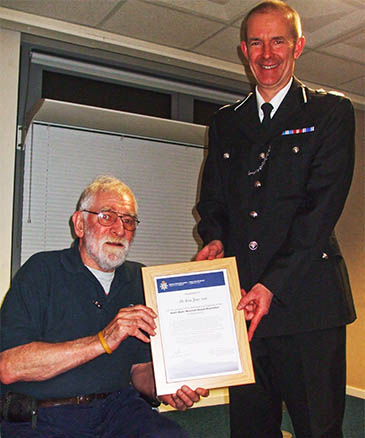A stalwart of mountain rescue in north Wales has been honoured after his retirement.
Dr Tony Jones has stepped down as chair of North Wales Mountain Rescue Association, the umbrella organisation for teams in the area.
He is a former member of the Ogwen Valley Mountain Rescue Organisation and was made an honorary life member of the team in 1998.
Search and rescue volunteers and emergency service professionals from across the region came together recently to mark Dr Jones’s retirement.
Among gifts received was a framed citation presented by Ian Shannon, Deputy Chief Constable of North Wales Police, in recognition of his work both in active and supportive roles for mountain rescue.
He first became involved in mountain rescue in South Africa in 1954 and retired as chair of the North Wales Mountain Rescue Association in March.
DCC Shannon said: “Tony is held in high regard by colleagues. He has been a member of the UK Search and Rescue Operators Group, chairman of the Medical Group, secretary of the Inland Consultative Committee and chairman of the Communications Working Group and attended the Maritime and Aviation Consultative Committee, since their inception in 2000.
“No one else has given so much of their life and commitment to volunteering as a rescuer, a team leader and executive officer.
“It was with the utmost pleasure that on behalf of North Wales Police and the many locals and visitors who have been rescued by him, I was able to personally thank Tony for his outstanding service.”
Gifts were also presented by the Coastguard and other members of the association.
Dr Jones’s mountaineering career has taken him all over the world, involved him in over 900 rescues, won him many accolades, including the MBE and the Queen’s Jubilee Medal, and made him the subject of a This is Your Life programme in 1993.
His search and rescue operations have been carried out in Wales, Western Cape, South Africa, England, Scotland, Norway, Austria, New Mexico and Washington State.
A geologist by profession, Dr Jones came to Wales to undertake a PhD in the 1960s and has lived in the area since then. He came to work at the Marine Science Laboratory, Bangor University, a move which enabled him to merge his work and lifelong love of the mountains.
He said: “I have always been part of a team. I have been involved in over 900 search and rescue operations, but I didn’t do any of it alone. It is critical in these circumstances to work as part of the team,”
Dr Jones said the volunteer teams were called on to help more often now. “An increase in the use of the hills results in an increase in incidents, which are creeping up each year,” he said.
“But when you look at the relationship between the increase and footfall there is no significant increase in the percentage of incidents.
“It equates to more use, more callouts.
“Mountain rescue is also a victim of its own success: the teams get callouts to non-mountain related incidents such as flooding. So the range of work has increased as well which contributes to callouts.
“Also before mobile phones if there was an accident someone would have to come down the mountain to get help.
“Mobiles speed up response, but also result in a number of parties not using their own initiative to get down.
“We’re also finding that many young people rely on technology. They have no fundamental skills, which is not always wise.”
Dr Jones, who remains an honorary member of the Search and Rescue Dog Association (Wales) and Mountain Rescue England and Wales, is currently transcribing the RAF Desert Rescue Diaries from the 1960s.


John Manning
09 April 2013What an honour to have known Tony since 1977! A great friend and advisor to The Dublin Wicklow MRT in particular. Always great to have you visit us, looking forward to your next visit Tony. Best wishes from all in Search and Rescue in Ireland.
John Manning
Liam Mc Cabe Chairman SEMRA & former IMRA Chair
09 April 2013Tony is a true friend to Irish Mountain Rescue. As a regular visitor to our annual conferences Tony has been a support and a valued link to our UK peers. We all look forward to your next visit.
Michel Delpierre
02 August 2014Tony has always given the best of himself from the time in South Africa at the UCT mountain & Ski Club where he always took on more than his share. A good man to have on your team.
I am privileged to have known and climbed with Tony. Have a good retirement!
Please pass on my email address to him.
Professor Philip Garner
28 August 2014Tony won't remember me - as a fresher at UCW Aberystwyth in 1966. But i certainly remember him, having done a couple of volunteer sessions at Ogwen Cottage whilst still a student. He always came across as mad keen, full of humour, and with a love of the mountains that was almost tangible. What a contribution to outdoor activities! Sorry this is belated: just seen this.
Mark Powell
21 February 2024Tony taught me as a Stafford Troop. There are some people in this world who have a direct effect on your life. Tony was one of them. I will never forget him.